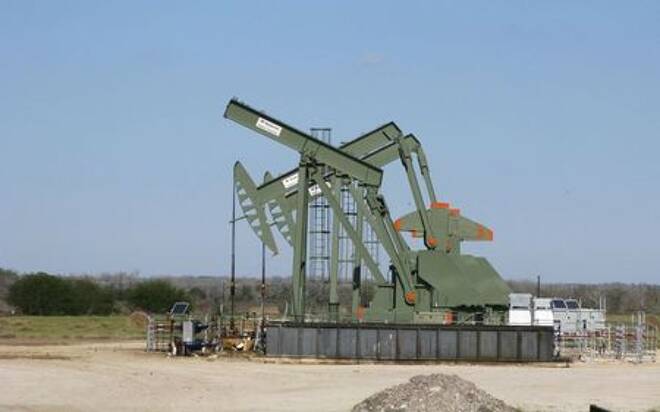Advertisement
Advertisement
Oil Dives Late, Hit by China Supply Plan, U.S. Bond Auction
By:
NEW YORK (Reuters) - Oil prices fell to a two-week low on Thursday as China rolled out a plan to release state oil reserves, the U.S. weekly crude draw was smaller than expected and U.S. Treasuries rallied as investors sought safer assets.
In this article:
In volatile trade, Brent futures fell $1.15, or 1.6%, to settle at $71.45 a barrel. U.S. West Texas Intermediate (WTI) crude fell $1.16, or 1.7%, to $68.14. That was the lowest settlement for both since Aug. 26.
“A tremendous auction in the 30-year bond with the lowest interest rate print since January put a significant scare into the (oil) market in what looks like a flight to safety,” said John Kilduff, partner at Again Capital LLC in New York.
After falling over $1 a barrel early in the session, both benchmarks turned positive following reports that a ship was stuck in the Suez Canal. The ship was refloated and caused no delays.
Oil held those gains following a U.S. report showing a much bigger-than-expected gasoline draw and on the continued slow return of U.S. production after Hurricane Ida.
But oil futures fell over $1 a barrel again soon after strong demand in the afternoon $24 billion U.S. 30-year bond auction pushed yields down to 1.91%. Investors sold riskier assets like oil and stocks.
Oil was pressured when China’s state reserves administration said it would release crude reserves in phases via public auction to help domestic refiners control costs.
“China tapping their crude oil reserves is huge news and should provide much relief for domestic refiners and chemical companies,” said Edward Moya, senior market analyst at OANDA.
U.S. crude stockpiles declined by 1.5 million barrels in the week to Sept. 3, according to government data, much less than the 4.6-million barrel draw analysts forecast.
The much bigger-than-expected 7.2 million barrel drop in gasoline inventories provided support for oil prices. Analysts forecast gasoline stocks would decline by just 3.4 million barrels.
Royal Dutch Shell Plc declared force majeure on some oil deliveries due to damage from Ida.
The Gulf’s offshore wells account for about 17% of U.S. output. Some 1.4 million bpd of crude production was still shut-in.
With U.S. COVID-19 cases surging among the unvaccinated, President Joe Biden will outline new approaches to control the pandemic, including a requirement that all federal employees get vaccinated.
Shell is considering making it mandatory for workers in some operations to get COVID-19 vaccinations or risk being fired.
Several U.S. airlines warned of a slowdown in ticket sales and cut revenue forecasts as the coronavirus Delta variant threatened travel.
For a look at all of today’s economic events, check out our economic calendar.
(Additional reporting by Noah Browning in London, Naveen Thukral in Singapore and Laura Sanicola in New York; Editing by David Goodman, Mark Potter and David Gregorio)
About the Author
Reuterscontributor
Reuters, the news and media division of Thomson Reuters, is the world’s largest international multimedia news provider reaching more than one billion people every day. Reuters provides trusted business, financial, national, and international news to professionals via Thomson Reuters desktops, the world's media organizations, and directly to consumers at Reuters.com and via Reuters TV. Learn more about Thomson Reuters products:
Latest news and analysis
Advertisement
